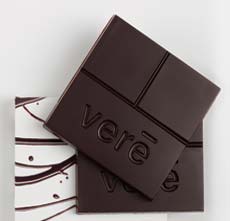 |
Glossary Of Glycemic Terms For Better Choices In ChocolateChocolate that is 85% cacao, like these bars from Vere, are higher in antioxidants than other chocolate. The higher the percentage of cacao, the greater the concentration of antioxidants. Glossary provided by Vere Chocolate. Antioxidants |
|
Blood Sugar / Blood Glucose Blood sugar (glucose) is the body’s fuel and, without it, the brain, nervous system, and tissues of the body would not be able to function. But too much glucose in the blood is not good for your health. If blood sugar levels soar above normal, a chain reaction occurs in the body: insulin is produced to bring the blood sugar down, then plummeting blood sugar levels can leave you fatigued, irritable, and often craving sweets and starches’the infamous sugar crash. Over time, in some individuals, this dangerous cycle may lead to your body being unable to adjust blood-sugar levels on its own, causing such as conditions as hypoglycemia and type 2 diabetes. |
||
| Fructose A natural sugar found in many fruits and vegetables. Manufacturers seeking to make healthier chocolate sweeten it with fructose for the following reasons:
|
||
| Functional Food Foods or dietary components that may provide a health benefit beyond basic nutrition, such as chocolate, inulin/oligofructose, nuts, berries and soy. |
||
| Gluten-Free A product that contains no gluten, which is a protein found in all wheat, rye and barley products. Many people suffer from varying degrees of gluten intolerance. |
||
| Glycemic Index The glycemic index, or GI, measures the rate in which carbohydrates breakdown in an ’average’ person’s body, and the resulting effect on blood sugar levels. Low GI foods (measuring less than 55) are easier on the body because they produce a gradual rise in blood sugar. Foods ranking between 55 and 70 are intermediate GI foods. Foods with a high GI of 70+ cause blood sugar and insulin levels to spike quickly, which can be detrimental to your health. However, it must be noted that the body’s response to the GI of any food can be affected by other conditions, such as whether food is consumed on an empty stomach, whether foods are consumed alone or in combination with other foods, and how foods are combined together. |
||
| Insulin Insulin is a chemical (a hormone) made by the pancreas, that helps transport glucose from the blood vessels into the body’s cells for use as energy. When the body senses an increase in blood glucose levels from consumption of foods that are high in carbohydrates (sugars and starches), the pancreas releases insulin into the bloodstream in order to regulate blood sugar levels and convert the glucose to energy. If your body doesn’t make enough insulin or if the insulin doesn’t work the way it should, glucose can’t get into your cells and it stays in your blood instead. Then, your blood glucose level gets too high, causing pre-diabetes or diabetes. |
||
| Inulin A natural, plant-derived dietary fiber and prebiotic. (NOTE: Inulin should not be confused with insulin [definition above], a substance generated by the pancreas.) |
||
| Organic Certified organic food is guaranteed to have been grown and processed without synthetic pesticides or fertilizers, irradiation, chemicals, artificial ingredients or preservatives of any kind. |
||
| Oligofructose A derivative of inulin obtained through partial enzymatic hydrolysis, that is also a dietary fiber and prebiotic. |
||
| Prebiotics Indigestible carbohydrates that stimulate the growth and activity of beneficial bacteria (probiotics) of the intestinal flora. |
||
| Probiotics Live, naturally-occurring microorganisms that function internally to promote healthy digestion, boost the immune system, and contribute to general health and wellbeing. |
||
| Sugar Alcohols / Polyols Carbohydrates that are often used to sweeten ’sugar-free,’ ’diet’ and ’diabetic’ products because they are incompletely absorbed by the body. While they do have fewer calories and elicit a lower glycemic response, they can cause unpleasant digestive problems in some consumers. |
||
| Sustainable A method of agriculture that integrates the principles of environmental health and efficient use of nonrenewable resources, while also working to ensure the profitability of farms and enhance the quality of life for farmers and society as a whole. |
||
| Vegan A product that is dairy-free, egg-free and devoid of all animal-derived ingredients. |
||
|
Virgin Coconut Oil Quite different than hydrogenated coconut oil, virgin coconut oil is considered by many to be a healthy and functional food, which may increase the metabolism, lower the cholesterol and boost the immune system. The saturated fat in virgin coconut oil is immediately converted by the liver into energy, instead of being stored as fat. It is also a good source of lauric acid, which is thought to be anti-bacterial and anti-viral. |
||
© Copyright 2005-2026 Lifestyle Direct, Inc. All rights reserved. All images are copyrighted to their respective owners.